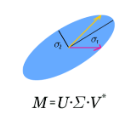Consider an operator that takes the Fourier transform of a discrete measure supported in $\mathcal{X}\subset[-\frac 12,\frac 12)^d$ and restricts it to a compact $\Omega\subset\mathbb{R}^d$. We provide lower bounds for its smallest singular value when $\Omega$ is either a ball or cube of radius $m$, and under different types of geometric assumptions on $\mathcal{X}$. We first show that if distances between points in $\mathcal{X}$ are lower bounded by a $\delta$ that is allowed to be arbitrarily small, then the smallest singular value is at least $Cm^{d/2} (m\delta)^{\lambda-1}$, where $\lambda$ is the maximum number of elements in $\mathcal{X}$ contained within any ball or cube of an explicitly given radius. This estimate communicates a localization effect of the Fourier transform. While it is sharp, the smallest singular value behaves better than expected for many $\mathcal{X}$, including when we dilate a generic set by parameter $\delta$. We next show that if there is a $\eta$ such that, for each $x\in\mathcal{X}$, the set $\mathcal{X}\setminus\{x\}$ locally consists of at most $r$ hyperplanes whose distances to $x$ are at least $\eta$, then the smallest singular value is at least $C m^{d/2} (m\eta)^r$. For dilations of a generic set by $\delta$, the lower bound becomes $C m^{d/2} (m\delta)^{\lceil (\lambda-1)/d\rceil }$. The appearance of a $1/d$ factor in the exponent indicates that compared to worst case scenarios, the condition number of nonharmonic Fourier transforms is better than expected for typical sets and improve with higher dimensionality.
翻译:暂无翻译



